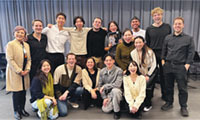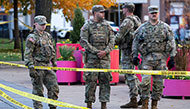▶ DAVID BROOKS
Shortly after they moved to Los Angeles, there was a problem with the lock to their apartment door. Jeffries’ mom called the locksmith and soon began a relationship with him. One evening the locksmith was looking over her phone bill and found a number he didn’t like. He smacked her in the head and sent her hurtling across the room. The beatings continued from then on.
Once his mother picked up Jeffries from Little League wearing big sunglasses, her eyes blackened underneath. Another day she tried to bar the locksmith from their apartment, but he kicked through the door. She moved to Burbank and got restraining orders, but on Nov. 25, 1985, the locksmith stalked her workplace and killed her with a sawed-off shotgun.
Jeffries was brought back to Newark and lived for a few months with his father. But one day he came home and his father had vanished, without leaving a note. By this time, he was numb; he just figured this was the way life is. His grandparents took him in and he spent the rest of his childhood with them, living on a street called Harding Terrace in the South Ward of Newark.
William Spear, who grew up on Harding Terrace a few years later, describes the street the way Jane Jacobs describes Greenwich Village in the 1950s: There were eyes everywhere. “You couldn’t cut class, because the neighbors would see you and call you on it,” Spear recalls. The neighbors couldn’t and can’t stop the worst violence — Spear’s brother was killed in 2012 when a street fight sent bullets flying through a block party — but they could keep some kids in line.
Jeffries’ grandparents brought stability to his life. He became active with the Boys and Girls Club. He did well in grade school, won a scholarship to Seton Hall Prep, then won scholarships to Duke and Columbia Law School, got a prestigious clerkship and began a legal career.
And then, having escaped Newark, he moved back to the crime-ridden South Ward. He has worked as a civil rights lawyer. He was the founding board president of a charter school in the Knowledge Is Power Program called Team Academy. He became an associate law professor at Seton Hall and took a leave from that to serve as assistant attorney general. In 2010, he ran for the Newark school board and became its president.
Now Jeffries is running for mayor of Newark against City Councilman Ras Baraka. The race has taken on a familiar shape: regular vs. reformer.
Baraka has the support of most of the major unions and political organizations. Over the years, he has combined a confrontational 1970s style of racial rhetoric with a transactional, machine-like style of politics. Baraka is well known in Newark and it shows. There are Baraka signs everywhere there.
Jeffries is the outsider and the reformer, promising to end the favor trading in government and modernize the institutions. Three months ago, it looked as though he had no shot of winning. And, according to close observers, he has not organized a particularly effective campaign. But he is an eloquent speaker and has strong people skills. His candidacy has become something of a cause célèbre among New York Democrats who fear Baraka would reverse the strides Newark has recently taken. Jeffries is still the underdog, but the election is much closer than it was.
The election on May 13 will be decided on two issues, one cultural and one structural. Jeffries is being portrayed as a Duke- and Columbia-educated law professor, not somebody who is truly of and for Newark. There’s a veiled or not-so-veiled debate here over what it means to be authentically African-American.
Then there is the split, which we’re seeing in cities across the country, between those who represent the traditional political systems and those who want to change them. In Newark, as elsewhere, charter schools are the main flash point in this divide. Middle-class municipal workers, including members of the teachers’ unions, tend to be suspicious of charters. The poor, who favor school choice, and the affluent, who favor education reform generally, tend to support charters.
These contests aren’t left versus center; they are over whether urban government will change or stay the same. Over the years, public-sector jobs have provided steady income for millions of people nationwide. But city services have failed, leaving educational and human devastation in cities like Newark. Reformers like Jeffries rise against all odds from the devastation. They threaten the old stability, but offer a shot at improvement and change.
스마터리빙
more [ 건강]
[ 건강]이제 혈관 건강도 챙기자!
[현대해운]우리 눈에 보이지 않기 때문에 혈관 건강을 챙기는 것은 결코 쉽지 않은데요. 여러분은 혈관 건강을 유지하기 위해 어떤 노력을 하시나요?
 [ 건강]
[ 건강]내 몸이 건강해지는 과일궁합
 [ 라이프]
[ 라이프]벌레야 물럿거라! 천연 해충제 만들기
 [ 건강]
[ 건강]혈압 낮추는데 좋은 식품
[현대해운]혈관 건강은 주로 노화가 진행되면서 지켜야 할 문제라고 인식되어 왔습니다. 최근 생활 패턴과 식생활의 변화로 혈관의 노화 진행이 빨라지고
사람·사람들
more
창작 뮤지컬 ‘도산’ 웍샵
창작 뮤지컬 ‘도산’이 뉴욕 맨해튼에서 미국배우조합 리딩 웍샵을 성공적으로 마쳤다. LA 무대예술인그룹 시선(대표 클라라 신)이 제작한 이 작…

“한국어 교육 확산 협력”
한국어진흥재단(이사장 모니카 류)이 숙명여대(총장 문시연)와 한국어 교육 확산을 위한 협력에 나선다. 한국어진흥재단의 모니카 류 이사장은 지난…
송년행사 시즌 ‘돌입’ 12월 첫 주부터 본격
추수감사절 연휴를 기점으로 남가주 한인사회가 본격적인 송년행사 시즌에 돌입한다. 한 해를 마무리하고 새해를 준비하기 위한 각 단체·동문회의 연…
KYCC·VWKC·주민의회 등 합동 타운 대청소 …
한인타운청소년회관(KYCC)과 헤더 허트 시의원(LA 10지구) 사무실, 그리고 행사에는 윌셔 한인타운 커뮤니티 목소리(VWKC), 내셔널 유…
ROTC 남가주 동지회 골프 모임
ROTC 남가주 동지회(회장 이창훈)는 지난 22일 라미라다 골프코스에서 골프 모임을 열었다. 이날 행사에는 30여 명이 참석해 라운딩을 함께…
많이 본 기사
- 이민 구금자수 역대 최다… 단순 체류위반 20배 폭증
- 한인 2세 지나 권씨 주정부 장관에
- 추수감사절 ‘포식’, 심장에는 위험 신호 될 수 있다
- 인간의 경쟁자 될까, 든든한 동료 될까… ‘휴머노이드의 진화’
- 국민연금 증명 편리해진다 온라인 아포스티유 발급
- 유동근♥전인화 CEO 딸, 방송 최초 출연.. “미모? 공들인 얼굴”
- 경찰관이 근무 중 도둑질 차량 수색하며 현금 꿀꺽
- 트럼프 “백악관 앞 총격은 테러”… 반이민 강화 고삐
- 연말을 향해 달리는 불빛의 궤적
- 집값 상승에 ‘투자 대이동’… 중산층 절반 이상이 ‘주식’
- 세대 잇는 서예, 전시로 만나다
- 라티노 이웃과 함께 땡스 기빙
- K-헤어케어 트리셀, Costco 250개점에 런칭
- 메이시스 추수감사절 퍼레이드
- LA 주차위반 단속 강화… 티켓 발부… 1
- 일주일 강수량이 무려 1.8미터… 동남아 ‘물폭탄 비명’
- 홍콩 77년래 최악 화재… ‘대나무 비계’타고 불길 번졌다
- 평통 미주지역회의, 강경화 대사 면담
- 복수국적 한인2세 피해 방지 ‘국적유보 신고제’ 추진
- MA주 공공안전보안부장관에 진아 권
- 80여 노인들, 모국 여행을 떠나다
- 한인 2세 댄 리, VA 주지사 인수위에
- 이병헌, 레오나르도 디카프리오·티모시 샬라메와 나란히..美시상식 후보
- KCS, 한인노인 대상 무료 법률 세미나
- LA 주민 3분의 2 “카운티 잘못된 방향 간다”
- 겨울철 심장 관리… 오메가3·크릴오일 질환 예방 효과 ‘글쎄’
- “반갑다 집값 둔화”… 5개월 연속 90만달러 밑돌아
- [마크 A. 시쎈 칼럼] 트럼프 승리를 파괴하는 백인 우월주의자들
- ‘캄보디아 범죄단지’ 한국인 대학생 살해 주범, 프놈펜서 체포
- 오늘 블랙 프라이데이, 샤핑시즌 개막
- 극단적 선택 시도 고백 후..MC몽, 이번엔 사기 피해 당부
- [이런 일도] ‘인간 세탁기’ 나온다
- JP모건, ‘S&P 500 목표가 8,000P’
- 사랑의 터키 한미재단에 백산 한의원, 성금 전달
- 우파활동가 암살에 주방위군 피격…긴장… 1
- 트럼프 관세발 물가… ‘정책 유턴’ 신호탄?
- 아마존, 사기 급증 경고 연말맞아 회사 사칭 극성
- 올들어 한인타운 교통사고 악화
- 트럼프 행정부, 올해 연방 공무원 32만명 감원
- 401K 비차별 테스트 준비
- ‘케데헌’ 더피가 뉴욕 하늘에…추수감사절 퍼레이드서 시선집중
- 이용대, ♥윤채경 열애설 질문에 당황.. “넘어가 달라”
- 알래스카 규모 6.0 지진
- “에어프레미아, 내년 3월 워싱턴 취항”
- 제주에서 수출한 일본판 ‘올레’… 1300년 전 길을 걷다
- 증시, 연휴 휴장·반장 오늘 오후 1시까지만
- 2026년 은퇴플랜 불입금 상한선 변화
- ‘도우인 메이크업(중국식 메이크업)’ 붐 타고… 동남아·일본 등 폭풍성장
- [한국춘추] 감사의 힘
- 내란특검, ‘정치관여·직무유기’ 조태… 1
1/5지식톡

-
 테슬라 자동차 시트커버 장착
0
테슬라 자동차 시트커버 장착
0테슬라 시트커버, 사놓고 아직 못 씌우셨죠?장착이 생각보다 쉽지 않습니다.20년 경력 전문가에게 맡기세요 — 깔끔하고 딱 맞게 장착해드립니다!장착비용:앞좌석: $40뒷좌석: $60앞·뒷좌석 …
-
 식당용 부탄가스
0
식당용 부탄가스
0식당용 부탄가스 홀세일 합니다 로스앤젤레스 다운타운 픽업 가능 안녕 하세요?강아지 & 고양이 모든 애완동물 / 반려동물 식품 & 모든 애완동물/반려동물 관련 제품들 전문적으로 홀세일/취급하는 회사 입니다 100% …
-
 ACSL 국제 컴퓨터 과학 대회, …
0
ACSL 국제 컴퓨터 과학 대회, …
0웹사이트 : www.eduspot.co.kr 카카오톡 상담하기 : https://pf.kakao.com/_BEQWxb블로그 : https://blog.naver.com/eduspotmain안녕하세요, 에듀스팟입니다…
-
 바디프렌드 안마의자 창고 리퍼브 세…
0
바디프렌드 안마의자 창고 리퍼브 세…
0거의 새제품급 리퍼브 안마의자 대방출 한다고 합니다!8월 23일(토)…24일(일) 단 이틀!특가 판매가Famille: $500 ~ $1,000Falcon: $1,500 ~ $2,500픽업 & 배송직접 픽업 가능LA…
-
 바디프렌드 안마의자 창고 리퍼브 세…
0
바디프렌드 안마의자 창고 리퍼브 세…
0거의 새제품급 리퍼브 안마의자 대방출 한다고 합니다!8월 23일(토)…24일(일) 단 이틀!특가 판매가Famille: $500 ~ $1,000Falcon: $1,500 ~ $2,500픽업 & 배송직접 픽업 가능LA…
케이타운 1번가
오피니언

오바마케어 보조금 연장 이뤄져야

UC, 등록금 인상 자제 노력 더 해야한다
 마크 A. 시쎈 / 워싱턴포스트 칼럼니스트
마크 A. 시쎈 / 워싱턴포스트 칼럼니스트 [마크 A. 시쎈 칼럼] 트럼프 승리를 파괴하는 백인 우월주의자들
 유경재 나성북부교회 담임목사
유경재 나성북부교회 담임목사 [한국춘추] 감사의 힘
 김인자 시인·수필가
김인자 시인·수필가 [금요단상] 장미의 이름, 진리의 이름
 최호근 / 고려대 사학과 교수
최호근 / 고려대 사학과 교수 [역사 속 하루] 태즈메이니아 섬 발견, 비극의 시작
 최형욱 / 서울경제 기자
최형욱 / 서울경제 기자 [만화경] AI 거품론과 ‘그린스펀 오판’
 조재성 LA 포럼 회장·도시비평가
조재성 LA 포럼 회장·도시비평가 [조재성 박사의 두 도시 이야기] 코리아타운, 불완전함의 아름다움
 김재천 서강대 국제대학원 교수
김재천 서강대 국제대학원 교수 [김재천 칼럼] 경제로 안보를 사는 시대
1/3지사별 뉴스

메이시스 추수감사절 퍼레이드
올해로 99회를 맞이한 메이시스 추수감사절 퍼레이드가 27일 맨하탄에서 화려하게 펼쳐졌다. 올해 퍼레이드에는 전 세계적으로 열풍을 일으킨 ‘케…
복수국적 한인2세 피해 방지 ‘국적유보 신고제’ 추진

라티노 이웃과 함께 땡스 기빙
추수감사절 아침, 갑자기 떨어진 기온에 찬바람까지 불면서 겨울이 다가옴을 실감할 수 있었다. 도시빈민을 섬기는 굿스푼선교회(대표 김재억 목사)…
MA주 공공안전보안부장관에 진아 권

트럼프 “총격당한 주방위군 병사 2명 중 1명 사망”
도널드 트럼프 대통령은 27일 아프가니스탄 출신 이민자로부터 전날 워싱턴DC의 백악관 인근에서 총격을 당한 주방위군 병사 2명 중 1명이 사망…
피아니스트 조성진, 내년 1월 SF에 온다

오늘 하루 이 창 열지 않음 닫기 


















































.png)


댓글 안에 당신의 성숙함도 담아 주세요.
'오늘의 한마디'는 기사에 대하여 자신의 생각을 말하고 남의 생각을 들으며 서로 다양한 의견을 나누는 공간입니다. 그러나 간혹 불건전한 내용을 올리시는 분들이 계셔서 건전한 인터넷문화 정착을 위해 아래와 같은 운영원칙을 적용합니다.
자체 모니터링을 통해 아래에 해당하는 내용이 포함된 댓글이 발견되면 예고없이 삭제 조치를 하겠습니다.
불건전한 댓글을 올리거나, 이름에 비속어 및 상대방의 불쾌감을 주는 단어를 사용, 유명인 또는 특정 일반인을 사칭하는 경우 이용에 대한 차단 제재를 받을 수 있습니다. 차단될 경우, 일주일간 댓글을 달수 없게 됩니다.
명예훼손, 개인정보 유출, 욕설 등 법률에 위반되는 댓글은 관계 법령에 의거 민형사상 처벌을 받을 수 있으니 이용에 주의를 부탁드립니다.
Close
x